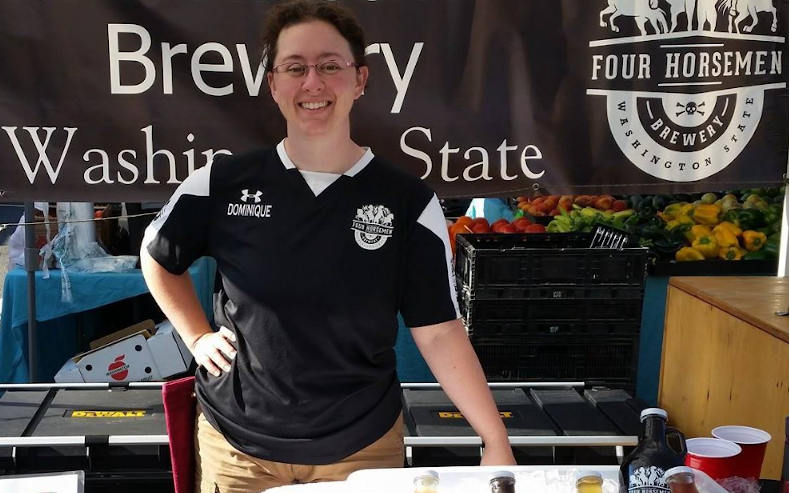
The suit alleges that counties across Washington have created impossible permitting processes.
Nobody said that opening and operating a brewery was easy. You need to lay out a lot of capital and put in a lot of hard work. That’s expected. However, some folks find that dedication, labor, and money are not enough. In some cases, brewery owners and would-be owners say that the deck is stacked against them, with local municipalities and officials creating a moving target of regulations and requirements that make it exceedingly difficult, if not impossible, to build and run a brewery.
One brewery owner, Dominique Torgerson of Four Horsemen Brewery, calls it “an existential threat from increasingly restrictive zoning codes that counties are using to effectively prohibit businesses like ours.”
Four Horsemen Brewery is taking the battle to the courtroom. Torgerson owns the brewery along with her brother, Dane Scarimbolo. They would appreciate hearing from other brewery and business owners who’ve endured similar difficulties. “If you operate a craft beverage business and have encountered unjust zoning restrictions, we urge you to share your experience,” Torgerson said. “Affidavits detailing your struggles can help strengthen our case and expose these unconstitutional barriers that counties are imposing.”
A Moving Target
This is not the first time we’ve reported on the impact of these kinds of issues on breweries in King County. In 2021, we reported that King County required Good Brewing Company to close one of its taprooms. At the time, Good Brewing and some other adult beverage businesses in an unincorporated area near Woodinville were impacted by a newly passed Adult Beverage Ordinance that precluded businesses like brewery taprooms from operating in certain places. Although “adult beverage” was in the name, it was more about land use than alcohol. It was complicated, to say the least, and it shut down businesses the county permitted to open and operate for years.
Many breweries and other businesses will tell you that in King County, the target is always moving, and the land beneath your feet constantly shifts, so it’s nearly impossible to get a shot off, much less hit the bullseye. Is it intentional, or is it just bureaucratic bungling?
Whatever it is, one brewery owner is fed up and is ready to hold the County’s feet to the fire. Four Horsemen Brewery is located in an unincorporated part of King County, about 45 minutes southeast of Seattle. Some folks might call the location Auburn, and some might call it Covington, but it is not part of either of those municipalities. While its battle is with King County directly, Four Horsemen says the problem is not isolated.
“The craft beverage industry—beer, wine, cider, and distilled spirits—is facing an existential threat from increasingly restrictive zoning codes that counties are using to effectively prohibit businesses like ours,” says Torgerson. “King County, followed by other counties, has implemented zoning regulations that create an impossible permitting process.”
“Obstruction and Financial Extortion”
King County shut down Four Horsemen Brewing in 2017 and demanded a change-of-use permit. Torgerson says this rapidly evolved into a much larger and costlier process requiring entire site drainage reviews, impact fees, and other excessive costs.
“Despite our structure having existed since 1983 with no structural changes or new construction, the county arbitrarily assessed permit fees exceeding $15,000 and projected a $175,000 development cost—without ever stepping foot on our property,” said Torgerson. “This bureaucratic nightmare extended for over two years, during which time every resubmission was met with ever-changing requirements from different county intake personnel. We were coerced into paying excessive fees under the threat that the upcoming King County Winery Brewery Distillery (WBD) ordinance would leave us without vested rights.”
In April 2020, King County finally issued the permit to proceed with modifications at Four Horsemen Brewing. “This pattern of obstruction and financial extortion is not just an isolated incident; it reflects a broader strategy by municipalities to make it functionally impossible for small alcohol-based businesses to operate,” says Torgerson. “Now, we are taking this fight to the courts, challenging the entire zoning code as unconstitutional. We argue that the county is violating our fundamental rights by enforcing intentionally vague zoning laws, making them inherently unconstitutional under the void for vagueness doctrine.”
Preparing for Battle
Although Dominique Torgerson just wants to operate a brewery, she is now well-versed in this kind of legal battle and knows way more about these issues than any brewery owner should ever need to know.
“With the recent overturning of the Chevron Deference doctrine at the U.S. Supreme Court, agencies should no longer have unchecked power to interpret ambiguous laws in their favor,” she explains. “Our petition to the Superior Court cites extensive case law, and we are prepared to take this battle to the U.S. Supreme Court if necessary.”
“Additionally, these zoning restrictions violate Washington State RCW 66.08.120, which explicitly prevents municipalities from regulating alcohol businesses in ANY manner,” she adds.
According to Torgerson, if the citizens of the county or state want to restrict adult beverage businesses, that’s a different issue. Her objection is to local entities and individuals in positions of power making decisions arbitrarily, presenting an innavigable maze of codes and requirements that effectively prohibit businesses like hers from operating.
“This is not just a local zoning issue; it is also inherently a fundamental rights issue that affects the entire industry,” she says. “If counties wish to restrict alcohol-based businesses, they must follow due process and allow the people—not officials, whether elected or unelected—to make that decision.”
“Let’s stand together and fight back against these unlawful restrictions before they spread further and cripple our industry.”
To share your stories and support Four Horsemen’s efforts, contact Dominique Torgerson at [email protected].












